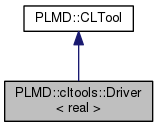|
| | Driver (const CLToolOptions &co) |
| |
| int | main (FILE *in, FILE *out, Communicator &pc) |
| | virtual function mapping to the specific main for each tool More...
|
| |
| void | evaluateNumericalDerivatives (const long int &step, Plumed &p, const std::vector< real > &coordinates, const std::vector< real > &masses, const std::vector< real > &charges, std::vector< real > &cell, const double &base, std::vector< real > &numder) |
| |
| string | description () const |
| | virtual function returning a one-line descriptor for the tool More...
|
| |
| template<> |
| string | description () const |
| | Specialized version. More...
|
| |
| void | setInputData (const std::map< std::string, std::string > &inputData) |
| | Set the input data: More...
|
| |
| const std::map< std::string, std::string > & | getInputData () |
| |
| bool | readInput (int argc, char **argv, FILE *in, FILE *out) |
| | Read the arguments from the command line. More...
|
| |
|
| enum PLMD::CLTool:: { ... } | inputdata |
| | How is the input specified on the command line or in an input file. More...
|
| |
|
| template<class T > |
| bool | parse (const std::string &key, T &t) |
| | Get the value of one of the command line arguments. More...
|
| |
| void | parseFlag (const std::string &key, bool &t) |
| | Find out whether one of the command line flags is present or not. More...
|
| |
| void | error (const std::string &msg) |
| | Crash the command line tool with an error. More...
|
| |
| template<class T > |
| bool | parseVector (const std::string &key, std::vector< T > &t) |
| |
◆ anonymous enum
How is the input specified on the command line or in an input file.
| Enumerator |
|---|
| unset | |
| commandline | |
| ifile | |
◆ Driver()
◆ description() [1/2]
◆ description() [2/2]
virtual function returning a one-line descriptor for the tool
Reimplemented from PLMD::CLTool.
◆ error()
| void PLMD::CLTool::error |
( |
const std::string & |
msg | ) |
|
|
protectedinherited |
Crash the command line tool with an error.
◆ evaluateNumericalDerivatives()
template<typename real >
| void PLMD::cltools::Driver< real >::evaluateNumericalDerivatives |
( |
const long int & |
step, |
|
|
Plumed & |
p, |
|
|
const std::vector< real > & |
coordinates, |
|
|
const std::vector< real > & |
masses, |
|
|
const std::vector< real > & |
charges, |
|
|
std::vector< real > & |
cell, |
|
|
const double & |
base, |
|
|
std::vector< real > & |
numder |
|
) |
| |
◆ getInputData()
| const std::map<std::string,std::string>& PLMD::CLTool::getInputData |
( |
| ) |
|
|
inlineinherited |
◆ main()
virtual function mapping to the specific main for each tool
Implements PLMD::CLTool.
◆ parse()
template<class T >
| bool PLMD::CLTool::parse |
( |
const std::string & |
key, |
|
|
T & |
t |
|
) |
| |
|
protectedinherited |
Get the value of one of the command line arguments.
◆ parseFlag()
| void PLMD::CLTool::parseFlag |
( |
const std::string & |
key, |
|
|
bool & |
t |
|
) |
| |
|
protectedinherited |
Find out whether one of the command line flags is present or not.
◆ parseVector()
template<class T >
| bool PLMD::CLTool::parseVector |
( |
const std::string & |
key, |
|
|
std::vector< T > & |
t |
|
) |
| |
|
protectedinherited |
◆ readInput()
| bool PLMD::CLTool::readInput |
( |
int |
argc, |
|
|
char ** |
argv, |
|
|
FILE * |
in, |
|
|
FILE * |
out |
|
) |
| |
|
inherited |
Read the arguments from the command line.
◆ registerKeywords()
◆ setInputData()
| void PLMD::CLTool::setInputData |
( |
const std::map< std::string, std::string > & |
inputData | ) |
|
|
inlineinherited |
◆ inputdata
| enum { ... } PLMD::CLTool::inputdata |
How is the input specified on the command line or in an input file.
The documentation for this class was generated from the following file:


 1.8.14
1.8.14